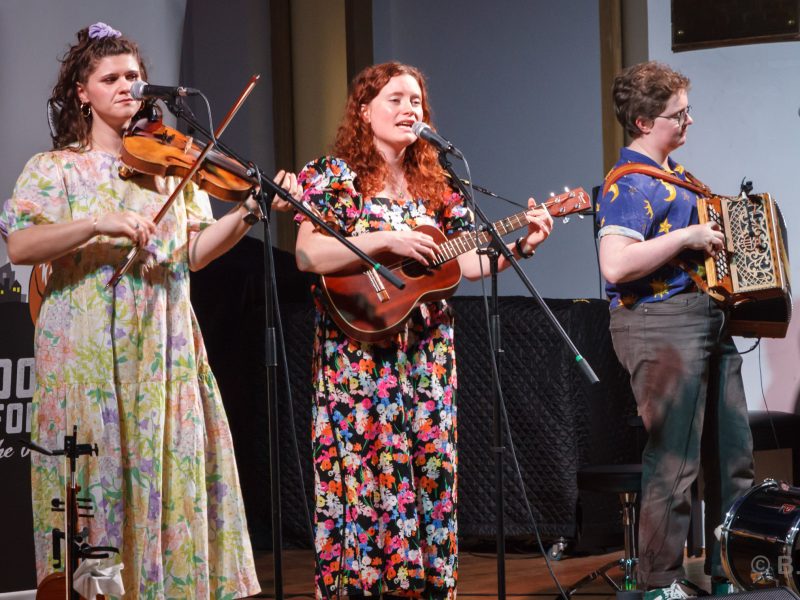THE ROSIE HOOD BAND + BRISTOL FOLK SINGERS
FRIDAY 21 MARCH 2025.
Watching The Rosie Hood Band is a bit like picking up a folky version of one of those Good Night Stories for Rebel Girls books. It’s an evening full of little portraits of interesting people, of tales to swell the heart and inhabit your innermost thoughts.
Rosie Hood has been in Downend before, as part of the Dovetail Trio, but tonight she’s with her own band. Joined by Robyn Wallace on melodeon and Rosie Butler-Hall on fiddle (but, sadly, without the injured Nicola Beazley) this is a “very rare” outing as a trio. Even with one fewer, they are still a page-turning thing, filled with wonder.
Hood is fascinated by the quiet pioneers, those that do the extraordinary but without fuss. It’s easy to see why; she is much the same. A Furlong of Flight tells the tale of Eilmer of Malmesbury, a monk credited as the first aviator (thanks to some home-made wings and the top of tower). It floats on eddies of sound, a lightness that is simply wrapped up in the air. Hood’s voice has an understated power, it’s as English as tea and scones, while Butler-Hall’s fiddle agitates the breeze, catching the paper-plane melody.
Ethel celebrates the life of Ethel Haythornthwaite, an environmental campaigner. It’s Ethel that we need to thank for protecting the Peak District and she is someone entirely worthy of a damn good folk song. Hood, of course, provides a song full of the joys of the countryside. It undulates, gently, as satisfying as a summer’s hike.
Hood and her band love a great story too. Hannah Twynnoy was, possibly, the first person to be killed by a tiger in England, in 1703, so why would you not want a song about that? You’d have to write it from the tiger’s point of view though. Tyger Fierce, from their latest album A Seed of Gold, is a swirling circus, voices coming from all corners as Hood and Butler-Hall lead dizzying rounds in an odd time signature. Wallace stomps out percussion and adds a melodeon whirl as Hood’s voice climbs through the madness, finally bursting for its cage. By the end, you are entirely on the tiger’s side.
As much as Hood loves to craft her own stories, she’s not averse to a brilliant cover version. Richard Hawley’s The Wood Collier’s Grave is a right ol’ foot-tapper, an old-timey bit of America, the see-saw fiddle kicking up a jig that’s enormous fun. I’ll Mount the Air on Swallow’s Wings, best known as an Unthanks song, is more gentle but equally glorious.
Right at the very heart of everything that The Rosie Hood Band do, is an inclusivity and a belief in the power of women. Roy Bailey’s Everything Possible has a comrade-ly sway, a firm, gentle defiance, Hood brooking no argument, setting her shoulders against intolerance. Bread & Roses, too, reminds us of struggle and protest. Hood contends that, as much as we need bread, we need the good stuff too. For her, the “roses” are going to gigs, singing, and playing music. It’s hard to argue. Les Tricoteuses, written by Jenny Reid, is a wonderfully modern folk song. It’s full of anger and resistance, of strength and feminine cool. It is as rousing a finale as you could wish.
The support for the evening came in the thirty-headed shape of the Bristol Folk Singers. Christ Church Downend is made for a sound like this; wondrous harmonies and intricately layered polyphony celebrating the unique community of the human voice. The Harvest Song has a bell-ringer’s clarity, it chimes across octaves, male and female voices sounding and over-lapping. There’s a softness to All Things Are Quite Silent, an impressive control and delicacy considering the number of voices. Then The Cropper Lads raises the roof.
Together, The Rosie Hood Band and the Bristol Folk Singers inspire dreams, they tell thrilling tales and spark the rebel in us all. The perfect Friday night.
Words: Gavin McNamara
Photos: Barry Savell


